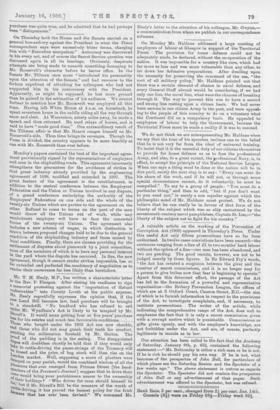A valuable article on the working of the Prevention of
Corruption Act (1906) appeared in Thursday's Times. Under this useful Act only fifteen prosecutions have so far been authorised. In twelve cases convictions have been secured—the sentences ranging from a fine of £1 to two months' hard labour without the option of a fine—one case has been abandoned, and two are pending. The good results, however, are not to be judged merely by these figures. In Sir Edward Fry's words, "tile Act has created a suspicion between the giver and the receiver of secret commissions, and it is no longer easy for a person to give bribes now that fear is beginning to operate." Apart from this deterrent effect, the passage of the Act has led to the formation of a powerful and representative organisation—the Bribery Prevention League, the offices of which are at 3 Oxford Court, Cannon Street, E.C.—the aim of which is to furnish information in respect to the provisions of the Act, to investigate complaints, and, if necessary, to institute prosecutions. The writer of the article, while indicating the comprehensive range of the Act, does well to emphasise the fact that it is only a secret commission given with a corrupt motive which is punishable. Commissions or gifts given openly, and with the employer's knowledge, are not forbidden under the Act, and are, of course, perfectly legitimate in morals as in law.




































 Previous page
Previous page